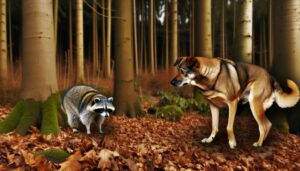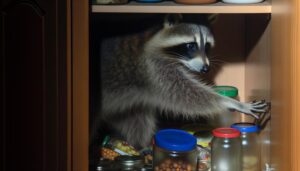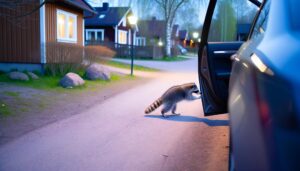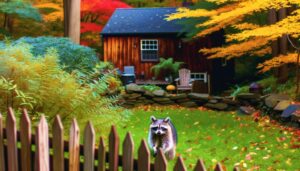How You Can Get a Pet Raccoon in Ohio Legally
Owning a pet raccoon in Ohio is legal but highly regulated. Ohio classifies raccoons as a regulated species, requiring potential owners to obtain a Wild Animal Permit from the Ohio Department of Natural Resources (ODNR).
This involves a detailed application process, including submitting documentation of appropriate living conditions, and proof of rabies vaccination. Local ordinances may impose additional restrictions.
Moreover, significant costs and compliance with health and safety regulations underscore the importance of both animal and community welfare. To understand the full scope of responsibilities involved in raccoon ownership, including detailed costs and housing needs, additional information is essential.
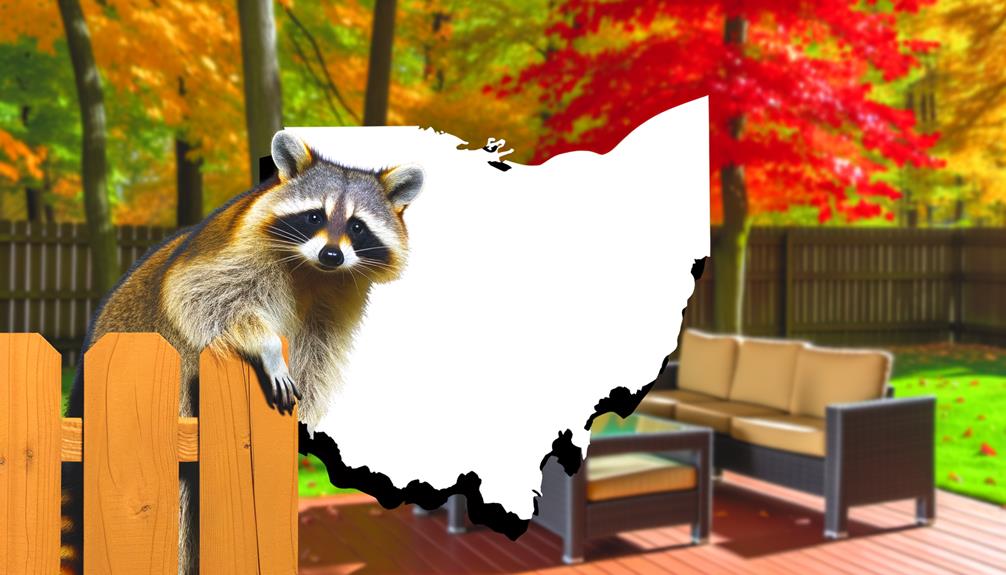
Key Takeaways
- Owning a pet raccoon in Ohio requires a Wild Animal Permit from the Ohio Department of Natural Resources (ODNR).
- Compliance with specific state regulations and local ordinances is mandatory for raccoon ownership.
- Detailed documentation and proof of rabies vaccination are necessary for the permit application.
- An inspection of the raccoon's living conditions may be required to verify regulatory compliance.
- Significant costs for permits, housing, diet, and veterinary care should be anticipated.
Legal Status in Ohio
The legal status of owning a pet raccoon in Ohio is governed by specific state regulations that potential owners must follow in order to guarantee compliance. Ohio classifies raccoons as wild animals, subjecting them to stringent rules to maintain public safety and animal welfare.
According to Ohio Administrative Code 1501:31-25-03, raccoons are considered a regulated species, and possessing one without adhering to state guidelines is prohibited. This classification aims to mitigate risks associated with zoonotic diseases and ecological impacts. Owners must be aware of local ordinances as additional restrictions may apply.
Comprehending these legal parameters is vital for responsible ownership and contributes to community well-being by ensuring both human and raccoon safety.
Required Permits
To legally own a pet raccoon in Ohio, potential owners must navigate a detailed permit application process. This process includes submitting specific documentation and meeting state-mandated criteria. Legal restrictions are in place to guarantee both the safety of the animal and the public, emphasizing the importance of adhering to regulatory standards.
Understanding these requirements is vital for compliance and successful pet ownership.
Application Process Overview
Acquiring a pet raccoon in Ohio requires going through a detailed application process to secure the necessary permits. Applicants must first complete the Ohio Department of Natural Resources (ODNR) Division of Wildlife's application form, which necessitates providing personal information, details of the raccoon's intended living conditions, and evidence of appropriate housing.
Additionally, it is vital to demonstrate knowledge of raccoon care, including dietary needs and healthcare requirements. The application must be accompanied by a fee, which varies depending on the permit type. Inspections of the living quarters by wildlife officials may also be required to ensure compliance with state regulations.
Successfully maneuvering this thorough process is essential for legally and ethically owning a raccoon in Ohio.
Legal Restrictions Clarified
Understanding the legal restrictions for owning a pet raccoon in Ohio involves obtaining specific permits that comply with state wildlife regulations. The Ohio Department of Natural Resources (ODNR) mandates acquiring a Wild Animal Permit, which guarantees that the raccoon is legally owned and properly cared for.
Applicants must provide detailed information about the animal's housing, diet, and veterinary care. Additionally, the permit requires proof of rabies vaccination and compliance with local zoning laws. Failure to obtain the necessary permits can lead to significant fines and potential confiscation of the animal.
These measures are intended to protect both the raccoon and the public, ensuring responsible pet ownership while preserving local wildlife ecosystems.
Application Process
Understanding the application process for obtaining a pet raccoon in Ohio requires a detailed understanding of state regulations and necessary permits.
To start with, potential raccoon owners must contact the Ohio Department of Natural Resources (ODNR) to obtain the appropriate application forms.
The applicant must provide detailed information about the raccoon's intended habitat, nutritional provisions, and veterinary care plans.
Additionally, background checks and inspections of the living environment are conducted to ensure compliance with animal welfare standards.
Applicants must also demonstrate knowledge of raccoon behavior and handling.
Once submitted, the application undergoes a review process by ODNR officials.
Approval or denial is based on adherence to state-specific guidelines and the applicant's capability to offer a safe, humane environment for the raccoon.
Costs Involved
The financial commitment required for obtaining and maintaining a pet raccoon in Ohio encompasses several key expenses. Procuring the necessary permits alone can be a considerable initial investment. These permits are essential to ensure compliance with state regulations. Furthermore, creating an appropriate and enriching habitat is crucial for the well-being of the raccoon. This necessity entails investing in durable materials and secure enclosures. Nutritional needs must be met through a balanced diet, which can be costly over time. Regular veterinary visits are essential for maintaining the health of the raccoon, including check-ups and vaccinations.
Investing in a pet raccoon also means being prepared for unexpected costs. Emergencies and specialized care may arise, requiring additional financial resources for the well-being of the animal. It's important to factor in all these expenses when considering the financial commitment of having a pet raccoon in Ohio.
Health and Safety Regulations
Adherence to Ohio's health and safety regulations is vital to secure the welfare of both the pet raccoon and its owner.
Ohio mandates that raccoon owners follow specific immunization schedules, especially against rabies, due to the high transmission risk. Regular health check-ups from a licensed veterinarian are necessary to monitor and manage any potential zoonotic diseases.
Proper housing requirements dictate secure, escape-proof enclosures that offer sufficient space and environmental enrichment. Additionally, raccoon owners must confirm the animal's diet meets nutritional standards to prevent malnutrition and related health issues.
Following these regulations not only secures the raccoon's well-being but also reduces risks to human health, promoting a safe and nurturing environment for all involved.
Raccoon Behavior
Given the significance of adhering to health and safety regulations, it is equally vital to understand the behavioral patterns of raccoons to ensure a harmonious human-animal relationship.
Raccoons are nocturnal creatures, exhibiting most of their activity during nighttime hours. Known for their agile front paws, they are skilled at manipulating objects and solving problems, which can lead to both entertaining and challenging interactions. Additionally, raccoons are highly intelligent, capable of remembering solutions to tasks for extended periods.
Socially, they tend to be solitary animals, though females often care for their young communally.
- Curiosity-driven exploration
- Nighttime activity leading to potential disturbances
- High intelligence requiring mental stimulation
- Strong instincts for foraging
- Potential for solitary behavior or maternal care
Understanding these behaviors is essential for fostering a positive environment.
Housing Needs
When considering the housing needs for a pet raccoon in Ohio, it is important to address both space and enclosure requirements to guarantee the animal's well-being. Adequate space must be provided to simulate a raccoon's natural habitat and behavioral patterns.
Additionally, climate control considerations are essential to maintain an environment conducive to the raccoon's health, given Ohio's variable weather conditions.
Space and Enclosure Requirements
Proper housing for a pet raccoon in Ohio necessitates a spacious and secure enclosure that meets the animal's behavioral and physical needs. Raccoons are active, inquisitive creatures that require ample space and stimulating environments to thrive. The enclosure should be constructed with sturdy materials to prevent escape and provide safety. A minimum recommended size would be 8'x8'x8', allowing enough room for climbing and exploring.
Additionally, incorporate elements that mimic their natural habitat, such as branches, platforms, and hiding spots.
- Ensures the raccoon's physical well-being and mental stimulation
- Prevents destructive behaviors due to boredom or confinement
- Reduces stress by providing a safe and familiar environment
- Facilitates easier maintenance and hygiene
- Enhances the bond between the owner and the raccoon
Climate Control Considerations
Maintaining appropriate climate control for a pet raccoon in Ohio is crucial to guarantee the animal's comfort and health throughout varying seasonal conditions. Given Ohio's humid continental climate, raccoon enclosures must be designed to mitigate temperature extremes.
During winter, make sure the indoor habitat is insulated and equipped with heating elements to maintain a stable temperature, ideally between 60-70°F.
In summer, adequate ventilation and cooling mechanisms, such as fans or air conditioning, are essential to prevent overheating, keeping temperatures below 80°F. Humidity levels should be monitored, aiming for a relative humidity of 40-60%.
Additionally, the enclosure should provide shaded areas and protection from direct sunlight. Proper climate control is indispensable for the well-being of pet raccoons.
Diet and Nutrition
A thorough understanding of a raccoon's dietary requirements is fundamental to guarantee their best health and well-being. Raccoons are omnivores, requiring a balanced diet that includes proteins, fats, and carbohydrates. Fresh fruits, vegetables, and high-quality protein sources like fish and poultry should form the core of their diet. Additionally, specialized raccoon food available in pet stores can help they receive necessary nutrients.
- Diverse diet: Ensures nutritional balance and prevents deficiencies.
- Fresh water: Constant access is vital for hydration and kidney function.
- Avoid harmful foods: Chocolate, caffeine, and grapes are toxic.
- Monitor portion sizes: Prevents obesity and related health issues.
- Supplements: May be necessary for specific health needs.
Meticulous attention to diet will support your raccoon's longevity and energy.
Veterinary Care
Ensuring proper veterinary care for pet raccoons in Ohio involves identifying veterinarians experienced with exotic animals. Qualified veterinarians can provide essential guidance for maintaining the animal's health and well-being.
Addressing common health concerns such as parasites and dental issues is also crucial. Qualified veterinarians can offer treatment and advice to prevent these issues from becoming more severe.
Adhering to state-specific vaccination protocols is vital. Compliance with vaccination requirements is necessary to prevent the spread of zoonotic diseases and protect both the raccoon and other animals in the area.
Finding Qualified Veterinarians
Identifying veterinarians with experience in treating exotic animals, particularly raccoons, is crucial for safeguarding the health and well-being of your pet in Ohio. Raccoons have unique physiological and behavioral needs that necessitate specialized knowledge.
When looking for a qualified veterinarian, consider their expertise in exotic pet care, specifically raccoons. Additionally, confirm that the clinic has the necessary facilities for proper diagnosis and treatment.
A compassionate veterinarian will offer peace of mind. Expert care can prevent potential health complications. Proper veterinary support guarantees a longer, healthier life for your raccoon. Specialized knowledge can address unique dietary and medical needs. Access to emergency care is vital for unforeseen issues.
Thoughtful selection of a veterinarian nurtures a flourishing pet-owner relationship.
Common Health Issues
Understanding the common health issues that raccoons may face is necessary to providing thorough veterinary care and ensuring their overall well-being. Raccoons are susceptible to several diseases, including canine distemper, rabies, and leptospirosis, which can greatly impact their health.
Parasitic infections such as roundworms and fleas are also prevalent and require regular monitoring and treatment. Additionally, raccoons may suffer from dental issues, including periodontal disease, necessitating periodic dental check-ups.
Ensuring proper nutrition is vital, as obesity and malnutrition are common concerns. Veterinary care should include routine health evaluations to detect early signs of illness, tailored dietary plans, and preventive measures against infectious diseases and parasites.
This all-encompassing approach promotes a healthier, longer life for pet raccoons.
Vaccination Requirements
Sufficient vaccination is essential for protecting pet raccoons against a variety of infectious diseases that pose significant health risks. In Ohio, pet raccoons should receive core vaccinations to safeguard their well-being and prevent zoonotic diseases.
Rabies vaccination is mandatory due to the high risk of transmission to humans. Additionally, vaccines for distemper, parvovirus, and adenovirus are crucial due to their prevalence and potential severity. Regular veterinary check-ups are recommended to monitor health and ensure timely vaccination updates.
- Preventing deadly diseases: Protect raccoons from fatal illnesses.
- Ensuring public safety: Minimize the risk of zoonotic disease transmission.
- Promoting animal welfare: Enhance overall health and longevity.
- Legal compliance: Adhere to Ohio state regulations.
- Peace of mind: Reassure owners of their raccoon's health status.
Socialization Requirements
Proper socialization is vital for ensuring that a pet raccoon adapts well to domestic life and interacts safely with humans and other animals. Socialization should ideally begin at a young age, as raccoons are inherently wild and may exhibit aggressive or unpredictable behaviors if not properly acclimated.
Introducing a raccoon to various stimuli—such as different people, common household noises, and other pets—can mitigate stress and reduce the likelihood of undesirable conduct. Structured and consistent exposure to these elements can help a raccoon become a well-adjusted companion.
Additionally, socialized raccoons are less likely to exhibit fear-based aggression, which is important for maintaining safety in a household setting. This foundational step is crucial for the raccoon's long-term well-being and harmonious integration into the home.
Training Tips
In addition to socialization, effective training techniques are imperative for managing the natural behaviors of a pet raccoon and promoting positive interactions within the household.
Utilizing consistent training methods can help mitigate raccoons' natural curiosity and intelligence, which often leads to mischievous behavior. Employ positive reinforcement strategies, such as treats and praise, to encourage desired actions and discourage undesirable ones.
Establish clear boundaries and routines to provide a structured environment that raccoons can understand and thrive in.
Here are essential tips to bear in mind:
- Consistency: Maintain uniform training methods to avoid confusion.
- Patience: Understand that training takes time and persistence.
- Positive Reinforcement: Reward good behavior to reinforce learning.
- Boundaries: Set clear, firm limits to guide behavior.
- Enrichment: Provide mental and physical activities to prevent boredom.
Ethical Considerations
When considering the adoption of a pet raccoon, it is important to examine the ethical implications associated with keeping a wild animal in a domestic environment. Raccoons have complex physical and psychological needs that may be challenging to meet in a home setting. Moreover, removing them from their natural habitat can disrupt local ecosystems and biodiversity. The following table highlights key ethical concerns:
| Ethical Concern | Impact on Raccoon | Impact on Environment |
|---|---|---|
| Psychological Stress | Anxiety, abnormal behavior | Reduced biodiversity |
| Physical Health | Malnutrition, disease | Disruption of food chains |
| Social Needs | Isolation, loneliness | Altered predator-prey dynamics |
| Conservation Status | Population decline | Ecosystem imbalance |
These considerations underscore the importance of carefully weighing the decision to domesticate raccoons.
Alternative Pets
Considering the challenges and ethical concerns associated with keeping a pet raccoon, prospective pet owners might explore alternative pets that are better suited for domestic life and pose fewer ethical dilemmas.
Small mammals, reptiles, and birds can offer companionship without the complexities related to wild animals like raccoons.
- Hamsters: Easy to care for and ideal for small living spaces.
- Parakeets: Sociable and can be trained to mimic speech.
- Guinea Pigs: Gentle and great for families with children.
- Leopard Geckos: Low-maintenance and fascinating to observe.
- Rabbits: Friendly and can be litter-trained, making them suitable for indoor living.
These alternative pets are more adaptable to household environments and align with ethical considerations, providing fulfilling companionship while respecting animal welfare.
Conclusion
In Ohio, acquiring a pet raccoon requires legal navigation, involving permits and a complex application process. Costs, health and safety regulations, and socialization requirements form a mosaic of responsibilities.
Training tips and ethical considerations further complicate this endeavor. Consequently, while the appeal of a raccoon as a pet may beckon, the intricate legalities and multifaceted obligations make it a challenging pursuit, guiding potential owners to explore alternative pets that integrate more smoothly with domestic life.

